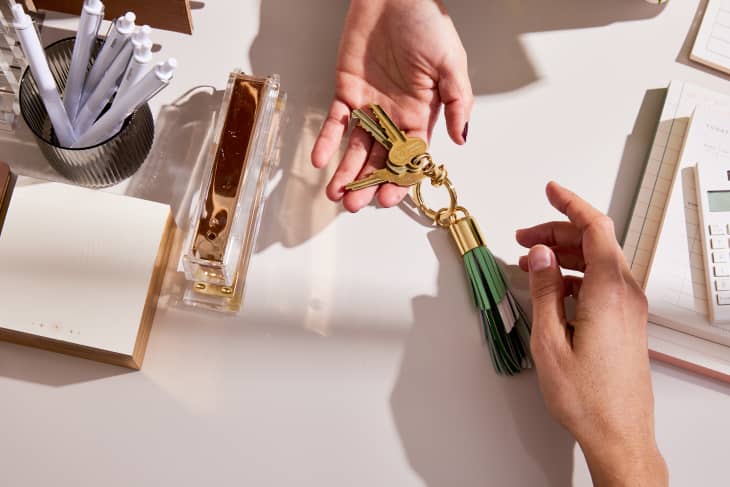3 Things a Landlord Wishes Other Landlords Would Do

When my friends went from living a 15-minute walk down the street from me to an hour-long drive away, I took that personally. Kidding — as much as I miss living close enough for a spontaneous week night hangout, I could only be thrilled for them as they did what every renter one day dreams of doing: Buying property. After getting married the summer before, they were ready to buy their first home together.
The housing market, however, had other ideas. “We wanted to buy a house, but it’s so impossible to afford,” explains my friend, Maren Madison. “Anything we could afford to make the down payment on, the monthly payment would be way too much for us.” So they opted instead to buy a two-unit building, renting out the larger unit so that rent from the tenants could help offset their monthly mortgage payments. A smart money move, to be sure, but one that led to a whole new set of responsibilities: They became landlords.
Now that they’ve owned the two-family home for about six months, I asked Madison how they’ve adjusted to being on the other side of renting. In addition to leaning on her own experience with property managers as a renter, she also confers with her parents, who have also been landlords, for advice on a regular basis. Though the ethics of being a landlord can be murky, as any renter who’s had a less-than-stellar experience well knows, Madison is determined to do the opposite of everything she resented about renting. Here are three things they’re doing that she wishes every landlord would.
Don’t be a helicopter landlord.
Madison and her husband moved every year for six years. Of those living situations, she says their best landlord was quick to respond, but was always around. “He didn’t live there but was there every single day putting around. It felt like we couldn’t really live our lives because the landlord was right there watching us,” she says. “Not that we were breaking rules, but it just felt weird.” Or, she recalls, she’d walk to the car and he’d stop her to have a conversation about the plants. “It was fine, but sometimes I just wanted to go to my car,” she says.
To help their tenants feel like they’re living independently even though their landlords live right upstairs, Madison says they’re making a conscious effort to give them space, especially given their physical proximity. Though it’s hard to toe the line between being friendly and accessible and a little too present, she says she’s “trying really hard not to butt in too much.”
Do be responsive and communicative.
In the worst renting situation Madison and her husband experienced, their heat broke in the middle of the winter and the landlord never fully fixed it. “They were like, eh we tried, and didn’t really fix it. So we didn’t have heat, which might be the worst landlord scenario I’ve had.” Another landlord, who they never met, would fix things only if they were completely dysfunctional. “If it wasn’t absolutely destroyed, they didn’t want to keep stuff working well,” she says.
Though new to landlording, they’re aiming to stay on top of issues as they come up to keep the home looking nice and feeling comfortable. “I just had a very intense morning of landlording,” Madison says when we talk. “The radiator downstairs was leaking so I tried to replace a piece and it literally fire-hose-style poured water all over me.” But when she needed to go into their unit to work on the repair, she was sure to follow the ground rules they’d agreed on. “Today when I had to go in and out of their apartment 100 times I told [the tenant], I’m coming down. I’m not going to knock because you told me not to. I’ve been trying to communicate very clearly.” When we talk about the role of a good landlord, I completely agree — to take responsibility for the maintenance of the building they own, but to respect the autonomy of the tenant at the same time. It’s their home too, after all.
Be the landlord you wish you had.
There are lots of little things Madison says she’s found herself letting go, just to be flexible in the way that she wishes previous landlords had been for her. Their tenants aren’t tandem parking their cars as outlined in the lease, for instance, but she recognizes they have big cars and it’s not a huge deal to give them an extra spot for the time being. They’ve been talking about getting a cat, which wasn’t previously agreed upon, but Madison says they’re fine with it and glad their tenants feel comfortable enough to ask them. “The other thing is we’re upstairs neighbors for them, so I’m very aware of the fact that I don’t want to be too loud,” she says. While you can text a neighbor to quiet down a bit, it’s trickier when that neighbor is the person who pay rent to. “Since we’re also the landlords, I don’t want him to be in a position where they’re uncomfortable with bringing something up,” she explains.
With some past landlords, Madison says, the most frustrating aspect “was the lack of caring about the actual space, and more just caring about the check they got every month.” Ultimately, they’re still learning how to be homeowners and landlords, moving around furniture and troubleshooting leaky radiators. But they’re keeping that one key fact top of mind as they do so: This building is all of their home, and it’s a space they care for.